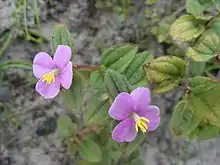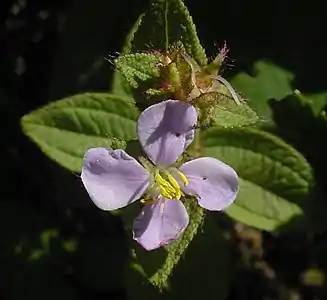Chaetogastra versicolor
Chaetogastra versicolor is a species of flowering plant in the family Melastomataceae, native to Brazil.[1] It was first described by John Lindley in 1827 as Rhexia versicolor.[2][3] One of its synonyms is Tibouchina versicolor.[1]
| Chaetogastra versicolor | |
|---|---|
 | |
| Scientific classification | |
| Kingdom: | Plantae |
| Clade: | Tracheophytes |
| Clade: | Angiosperms |
| Clade: | Eudicots |
| Clade: | Rosids |
| Order: | Myrtales |
| Family: | Melastomataceae |
| Genus: | Chaetogastra |
| Species: | C. versicolor |
| Binomial name | |
| Chaetogastra versicolor | |
| Synonyms[1] | |
| |
Chaetogastra versicolor has flowers with four petals and eight stamens, rather than five and ten as in many other species of Chaetogastra. The petals are white, turning pink as they age. The leaves are reddish underneath.[4]
_Bot._Reg._13_t.1066.jpg.webp) Original botanical illustration of 1827
Original botanical illustration of 1827 Flower
Flower
References
- "Chaetogastra versicolor (Lindl.) P.J.F.Guim. & Michelang.", Plants of the World Online, Royal Botanic Gardens, Kew, retrieved 2022-05-11
- "Chaetogastra versicolor (Lindl.) P.J.F.Guim. & Michelang.", The International Plant Names Index, retrieved 2022-05-11
- "Chaetogastra versicolor (Lindl.) P.J.F.Guim. & Michelang.", Tropicos, Missouri Botanical Garden, retrieved 2022-05-08
- Lindley, John (1827), "Rhexia versicolor", Botanical Register, vol. 13, London, t. 1066, retrieved 2022-05-11
This article is issued from Wikipedia. The text is licensed under Creative Commons - Attribution - Sharealike. Additional terms may apply for the media files.